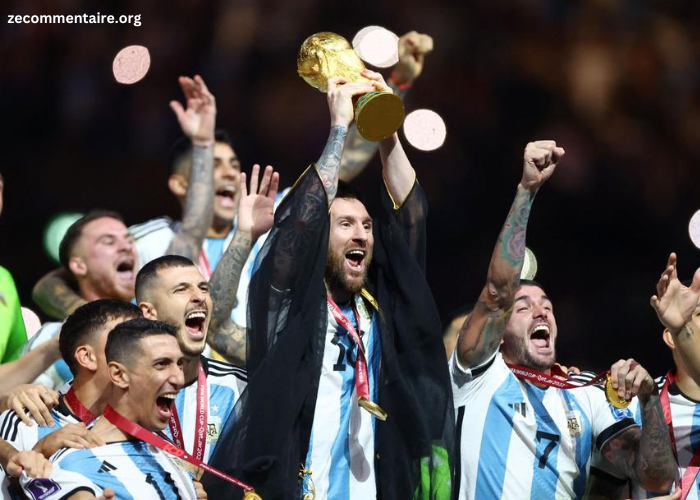The FIFA World Cup Qatar 2022, held from November 20 to December 18, 2022, was a historic event for football enthusiasts around the world. This tournament, the first ever to be held in the Arab world and during the winter months, brought together 32 national teams to compete in a month-long celebration of football. The event was notable not only for its unique scheduling and location but also for its remarkable matches, star performances, and cultural impact. This article delves into the key aspects of the World Cup, from its groundbreaking features to memorable moments and significant outcomes.
A Historic First: Winter World Cup in the Middle East
The choice of Qatar as the host nation for the 2022 World Cup marked a significant shift in the traditional scheduling of the tournament. Traditionally held in the summer, the World Cup was rescheduled to winter due to Qatar’s extreme summer temperatures. This adjustment allowed players to compete in more favorable weather conditions, enhancing the overall quality of the matches. Qatar’s bid for the World Cup was also a milestone for the Middle East, making it the first Arab nation to host the prestigious event. The choice of Qatar highlighted the growing influence and investment of the region in global sports.
Stadiums and Infrastructure: A Glimpse into Modernity
Qatar invested heavily in infrastructure and stadium development to ensure a successful World Cup. The tournament featured eight state-of-the-art stadiums, each designed with unique architectural styles and sustainable technologies. Notable venues included the Lusail Iconic Stadium, the Al Bayt Stadium, and the Education City Stadium. These stadiums were not only designed to provide an exceptional viewing experience but also to reflect Qatar’s commitment to modernity and environmental sustainability. The compact nature of the tournament, with stadiums located within a short distance of each other, allowed fans to attend multiple matches in a single day, enhancing the overall experience.
Memorable Matches and Key Moments
The 2022 World Cup was filled with thrilling matches and unforgettable moments. One of the standout fixtures was the final, where Argentina, led by Lionel Messi, faced France in a match that became an instant classic. The game, held at the Lusail Iconic Stadium, ended in a dramatic penalty shootout after a 3-3 draw in regular and extra time. Lionel Messi’s performance was particularly notable, as he secured his status as one of the greatest players in football history by winning the World Cup and earning the Golden Ball award for the tournament’s best player.
Another memorable moment was the performance of Morocco, which became the first African nation to reach the semi-finals of the World Cup. Their remarkable journey captured the hearts of fans around the world and showcased the growing competitiveness of football across different continents. The Moroccan team’s success was a testament to the talent and determination present in African football.
The Impact of Technology and VAR
The 2022 World Cup saw the continued use of technology to enhance the accuracy of officiating. The Video Assistant Referee (VAR) system, introduced in the previous World Cup, was once again a crucial part of the tournament. VAR played a significant role in reviewing and overturning decisions, ensuring greater fairness and accuracy in the matches. Additionally, the tournament featured semi-automated offside technology, which provided more precise and timely offside calls. These technological advancements contributed to a more transparent and reliable officiating process, improving the overall integrity of the game.
Cultural and Social Implications
The World Cup in Qatar also had profound cultural and social implications. The tournament served as a platform for showcasing Qatari culture and hospitality to a global audience. The opening ceremony, held at the Al Bayt Stadium, featured a blend of traditional and contemporary performances, highlighting the rich cultural heritage of the region. The event also prompted discussions about various social issues, including human rights and the treatment of migrant workers. These conversations underscored the broader impact of hosting such a global event and the need for ongoing dialogue and improvement in addressing these concerns.
Economic and Tourism Impact
The FIFA World Cup is not only a sporting event but also a significant economic and tourism driver for host countries. Qatar’s investment in infrastructure, stadiums, and services was aimed at boosting its global profile and attracting tourists. The influx of visitors for the tournament provided a substantial boost to the local economy, benefiting various sectors including hospitality, transportation, and retail. The event also served as a catalyst for further development and modernization in Qatar, positioning the country as a key player on the international stage.
Legacy and Future Prospects
As with every World Cup, the 2022 tournament left a lasting legacy for Qatar and the football world. The state-of-the-art stadiums and infrastructure developed for the event will continue to benefit the region and serve as a testament to Qatar’s commitment to sports and global engagement. The World Cup also provided a platform for showcasing football talent and promoting the sport’s growth across different regions.
Looking ahead, the lessons learned from the 2022 World Cup will influence future tournaments. The emphasis on technology, sustainability, and cultural exchange will likely shape the direction of international football events. As the world eagerly anticipates the next World Cup, the legacy of Qatar 2022 will continue to inspire and impact the global football community.
Conclusion
The FIFA World Cup Qatar 2022 was a landmark event in the history of international football. From its innovative scheduling and state-of-the-art facilities to its memorable matches and cultural impact, the tournament showcased the dynamic and evolving nature of the sport. As fans reflect on the excitement and drama of the World Cup, the legacy of Qatar 2022 will remain a significant chapter in the story of football.





